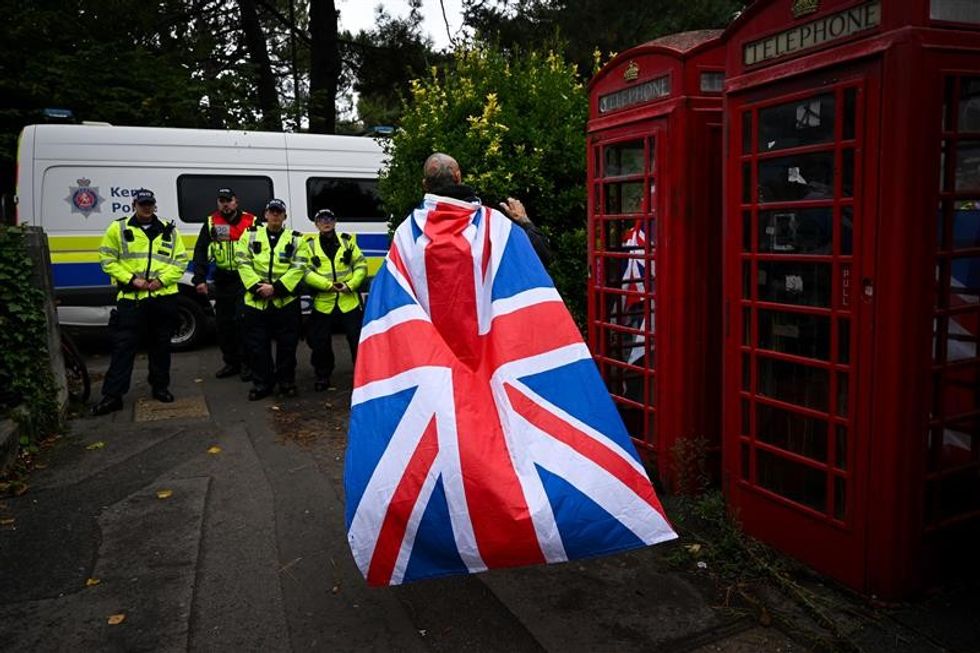Politics
National Flags Should Symbolize Unity, Not Division in Britain

The debate over the significance of Britain’s national flags has intensified, drawing lines between those who advocate for their representation and councils accused of undermining them. Critics point to left-wing councils, such as the Birmingham City Council, which have removed the Union Flag and St George’s Cross from public spaces. This action has sparked accusations of rejecting British symbols while allowing other flags to fly freely, leading to a perception of division rather than unity.
The importance of the Union Flag and the St George’s Cross goes beyond mere symbolism; they are reminders of Britain’s rich history and the sacrifices made by countless individuals who served under them. British Muslims, among other ethnicities and faiths, have played pivotal roles in defending the values that define modern Britain, such as democracy, liberty, and the rule of law.
On the 80th anniversaries of VE Day and VJ Day, a British Muslim MP expressed pride in leading a parliamentary debate commemorating these significant events. The end of the Second World War marked a time when Britain and its allies united against fascism. The contributions of servicemen from the Commonwealth, including individuals like Lance Corporal Samundar Khan, who received the Indian Distinguished Service Medal while serving under the British flag, should not be forgotten.
Today, over 10 percent of British armed forces personnel come from minority backgrounds. This includes the Gurkha Regiment, renowned for their bravery and dedication, who also serve under the Union Flag. These flags are not the property of any political party, religion, or ethnicity; they belong to all British citizens.
As a British citizen of Pakistani heritage, the sight of these flags flying above schools, hospitals, and Parliament evokes a deep sense of pride. Embracing both one’s heritage and nationality should not be an either-or proposition. Instead, modern Britain should celebrate the duality of identity, recognising that heritage and nationality can coexist harmoniously.
Political populism has often attempted to create an “us vs them” narrative that targets British Muslims and others. In response, the MP urges fellow British Muslims not to hide their identities. Their contributions, from serving in the NHS to leading in politics and education, deserve recognition and celebration.
For over a century, pride in the Union Flag and the St George’s Cross has come to signify British Asian representation. Many immigrants arrived in Britain with aspirations and determination, contributing to the fabric of society while flying these flags. Unfortunately, extremists on the far right have attempted to co-opt these symbols as emblems of exclusion.
The Union Flag and the St George’s Cross should remain symbols of unity, representing equality, freedom, and the diverse communities that have shaped the nation. Whether displayed at sporting events, military parades, or civic celebrations, these flags should stand for pride and togetherness, rather than division.
The message is clear: “We are proud, we are British, we are English, we are one nation.” The dialogue surrounding national symbols must shift towards fostering inclusivity and celebrating the shared values that unite all citizens.
-

 Health3 months ago
Health3 months agoNeurologist Warns Excessive Use of Supplements Can Harm Brain
-

 Health3 months ago
Health3 months agoFiona Phillips’ Husband Shares Heartfelt Update on Her Alzheimer’s Journey
-

 Science1 month ago
Science1 month agoBrian Cox Addresses Claims of Alien Probe in 3I/ATLAS Discovery
-

 Science1 month ago
Science1 month agoNASA Investigates Unusual Comet 3I/ATLAS; New Findings Emerge
-

 Science4 weeks ago
Science4 weeks agoScientists Examine 3I/ATLAS: Alien Artifact or Cosmic Oddity?
-

 Entertainment4 months ago
Entertainment4 months agoKerry Katona Discusses Future Baby Plans and Brian McFadden’s Wedding
-

 Science4 weeks ago
Science4 weeks agoNASA Investigates Speedy Object 3I/ATLAS, Sparking Speculation
-

 Entertainment4 months ago
Entertainment4 months agoEmmerdale Faces Tension as Dylan and April’s Lives Hang in the Balance
-

 World3 months ago
World3 months agoCole Palmer’s Cryptic Message to Kobbie Mainoo Following Loan Talks
-

 Science4 weeks ago
Science4 weeks agoNASA Scientists Explore Origins of 3I/ATLAS, a Fast-Moving Visitor
-

 Entertainment4 months ago
Entertainment4 months agoLove Island Star Toni Laite’s Mother Expresses Disappointment Over Coupling Decision
-

 Entertainment3 months ago
Entertainment3 months agoMajor Cast Changes at Coronation Street: Exits and Returns in 2025









